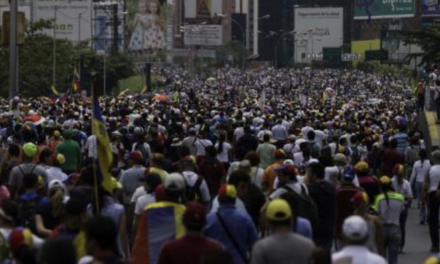The June 19 meeting of foreign ministers of Organization of American States (OAS), held immediately before the OAS General Assembly in Cancun, Mexico, saw no major breakthroughs regarding the situation in Venezuela. Nevertheless, the door is not closed on an OAS resolution, nor do the efforts of multilateral diplomacy depend on one.
Although the session began with an assurance by its presiding facilitator, Guatemalan Foreign Minister Carlos Raúl Morales, that the two competing resolutions which emerged in the previous May 31 meeting had been reconciled into a single document with broad support, it soon became clear that the new document might come up short. Representatives of many countries which have been reluctant to criticize the Maduro government raised concerns that they had not seen a copy of the draft resolution until the meeting began. St. Vincent and the Grenadines even went so far as to re-submit the CARICOM resolution under its own sponsorship, in a rebuke to other Caribbean nations that had negotiated the other resolution on CARICOM’s behalf.
The “consensus” resolution contained five points which called for the respect of human rights, an end to violence, the resumption of dialogue based on the fulfillment of pre-conditions suggested by the Vatican (freeing political prisoners, an electoral calendar, and respect for the separation of constitutional powers), and for the government to reconsider its convocation of a Constituent Assembly “as currently conceived.” This last element proved to be the primary sticking point. Several Caribbean countries voiced doubt over whether this violated the OAS’ principle of non-intervention into states’ internal affairs.
In the end, neither the new resolution (which got 20 votes) nor the St. Vincent and the Grenadines statement (with just 8 votes) had the necessary two-thirds majority (23 votes) to pass.
However, this does not spell the end of the line for countries of the hemisphere interested in working together to meaningfully address the crisis.
First, the Cancun General Assembly is not over yet. There is a chance that, before it comes to an end on 8:00pm local time on June 21 a resolution could emerge out of the General Assembly, where it would need just a simple majority (or 18 votes) to pass. This fact was alluded to by multiple countries in the foreign ministers’ meeting, who pointedly remarked that a majority of the room supported the new resolution.
Second, the meeting of foreign ministers was never officially adjourned, meaning that the foreign ministers could meet again regarding the situation in Venezuela.
In any case, any resolution that comes from the OAS will only have symbolic importance and will need to be followed-up with non-OAS initiatives. A firm OAS resolution could make the government more willing to dialogue and negotiate, and regional allies more willing to make significant efforts to facilitate. But if the OAS were to come up with some sort of plan to facilitate dialogue and negotiation in Venezuela, it would be immediately rejected by Venezuela. Thus, such an initiative will need to originate from outside of the OAS, and this could happen without an OAS resolution as well.
Indeed, while no resolution emerged, Monday’s discussion demonstrated widespread support in the hemisphere for the proposal of a “group of friends” or “contact group” of countries from the region that could help sponsor meaningful negotiation between the government and the Venezuelan opposition. Both resolutions contained language to this effect, and the idea came up multiple times in the remarks of representatives.
Last week Peru’s Pedro Pablo Kuczynski became the first head of state to publicly propose such a measure. He suggested that six countries could play this role, with three selected by the opposition and three by the government. These six countries would then select a capable mediator for talks. Whether or not this sort of arbitration model—more common in commercial disputes than international diplomacy—is the right solution, it is important that proposals are being forwarded.
And this is what is gained by this type of multilateral diplomacy. The process itself produces shared understandings, expressed commitments and diplomatic networks that go beyond the actual meetings and can lead to actions beyond the multilateral body in question.
In this case, the twenty countries that supported the resolution last night need to engage with the countries that abstained or voted against it. As the international relations scholar Mariano de Alba points out, these latter countries—like Ecuador, El Salvador and the Dominican Republic—are precisely the ones best poised to reach out to the Venezuelan government and bring them to the table as part of a meaningful negotiations process.




